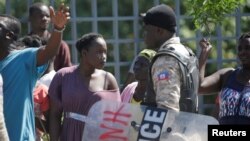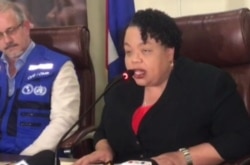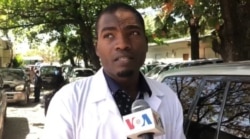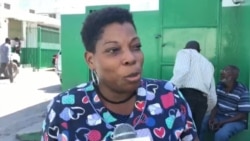Haiti’s public health minister says there are at least 941 confirmed cases of the coronavirus in the Americas, as the virus continues to spread globally.
“In the Dominican Republic, there are nine confirmed cases,” Marie Greta Roy Clement told reporters on Wednesday. “But I’d like to note that the cases in the Dominican Republic are imported cases, meaning the patients came from foreign countries. There has not yet been — according to my conversations with my Dominican counterpart — any community transmission of the disease.”
Clement said this is particularly important for Haiti, which shares a border with the Dominican Republic.
According to the health minister, Haiti has no suspected nor confirmed cases of the virus on its territory — as of yet. She said additional measures have been rolled out to protect the country.
Airports, official border crossings
The Caribbean nation’s two international airports — in Port-au-Prince and Cape Haitian — are screening incoming passengers for the virus, Clement said.
“When a passenger arrives at the airport — no matter where you are coming from — your temperature will be taken and you will be given a form to fill out,” she said. “We also hand out a sanitary information form which provides information about who to call, how to protect yourself and what to do if you experience symptoms.”
The minister said at Haiti’s official border crossings, additional measures have been implemented to thoroughly screen travelers.
“As you know we have four official entry points, but there are more than 200 unofficial crossings,” Clement noted. “At the four official border crossings — at Malpasse, Ouanaminthe, Belladere, and Anse a Pitre — we are screening travelers using the same methods the airports are using and we are intensifying our efforts there.”
Training
Clement said Haiti’s Health Ministry is also providing coronavirus training this week to doctors, nurses and journalists.
“On Saturday [March 14] we will be training health professionals at the nation’s private hospitals — because we can’t expect patients to only be seen at the state-run hospitals — so we will continue working with the private hospitals to get them ready,” she said.
Health professionals who were previously trained on infectious diseases will be working with local officials in the country’s 10 departments to brief them on best practices with regards to the new virus.
“We trained CMI’s [Infectious Disease Coordinators] who will take a leadership role in training the different departmental officials on how to deal with coronavirus cases,” she said.
Immigration agents also received training on detecting possible cases of the virus and what questions to ask visitors to determine whether or not they pose a potential health risk.
Hospital workers fear outbreak
News of the intensified efforts in Haiti comes after doctors and nurses at the state-run General Hospital in the capital decried their own lack of preparedness.
“It’s sad to say this but the hospital receives a lot of patients daily and we are not — I repeat — we are not ready, as far as I know, to diagnose a person who has the coronavirus,” Dr. Jacques Mackenzie told VOA Creole, adding that they don’t even have the test to determine if someone is infected.
Marie Catherine, a nurse at the hospital, told VOA she was unaware of the Health Ministry’s directives.
“We are already working under conditions that are not normal for most hospitals and now it’s gotten worse,” Catherine said. “The Ministry of Public Health has never discussed with us its policy for what to do when we receive the first coronavirus case in Haiti.”
Haiti’s hospitals were hit hard during the mass anti-government and anti-corruption protests last year, during which roads were barricaded, public sanitation employees stayed home and basic supplies were critically low.
Greater visibility
Since last week’s outcry, the Haitian government has been more visible on social media, with regards to coronavirus prevention and news. The presidential press secretary, Eddy Jackson Alexis, has been posting alerts on his official Twitter account.
The health minister said the government has established a second emergency telephone line — 116 (equivalent to 911 in the U.S.) and that they are working on a third emergency line that citizens can call at no charge, for information on the virus.
“What is most important with regards to this pandemic is notifying the public,” Clement told the press. “We have public information announcements airing on TV and radio with advice on how to wash your hands, avoid touching your face, eyes and mouth and what are the best practices when coughing or sneezing to avoid infecting others.”
Clement also advised social distancing as a way of preventing the possible spread of the virus.







